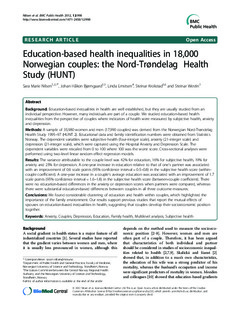| dc.description.abstract | Background
Education-based inequalities in health are well established, but they are usually studied from an individual perspective. However, many individuals are part of a couple. We studied education-based health inequalities from the perspective of couples where indicators of health were measured by subjective health, anxiety and depression.
Methods
A sample of 35,980 women and men (17,990 couples) was derived from the Norwegian Nord-Trøndelag Health Study 1995–97 (HUNT 2). Educational data and family identification
numbers were obtained from Statistics Norway. The dependent variables were subjective health (four-integer scale), anxiety (21-integer scale) and depression (21-integer scale), which were captured using the Hospital Anxiety and Depression Scale. The dependent variables were rescaled from 0 to 100 where 100 was the worst score. Cross-sectional analyses were performed using two-level linear random effect regression models.
Results
The variance attributable to the couple level was 42% for education, 16% for subjective health, 19% for anxiety and 25% for depression. A one-year increase in education relative to that of one’s partner was associated with an improvement of 0.6 scale points (95% confidence interval = 0.5–0.8) in the subjective health score (within-couple coefficient). A one-year increase in a couple’s average education was associated with an improvement of 1.7
scale points (95% confidence interval = 1.6–1.8) in the subjective health score (between couple coefficient). There were no education-based differences in the anxiety or depression scores when partners were compared, whereas there were substantial education-based differences between couples in all three outcome measures.
Conclusions
We found considerable clustering of education and health within couples, which highlighted the importance of the family environment. Our results support previous studies that report the mutual effects of spouses on education-based inequalities in health, suggesting that couples develop their socioeconomic position together. | nb_NO |

